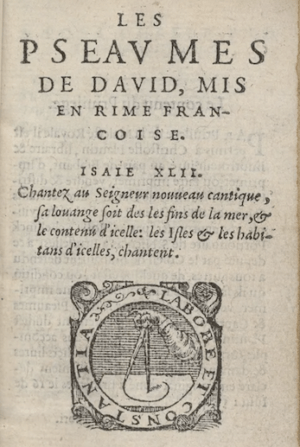Christianity Today is running a series entitled, “Re-Formed” featuring essays by “John Calvin with Knox Bucer-Beza”—identified by CT as “the author of the Institutes of the Christian Religion and commentaries on most books of the Bible, both of which were sources of . . . Continue reading →
suffering
Against the Theology of Glory
Introduction Many Christians today take it as an article of faith that God must deliver Christians from trials and tribulations. This is an age in which Benny Hinn’s ridiculous books have sold millions and he is but the latest charlatan selling health . . . Continue reading →
Office Hours: The Struggle Of Sanctification In The Psalms (2)
There are different types of the psalms in the psalter (the 150 Psalms). In this episode, Bryan Estelle, Professor of Old Testament at Westminster Seminary California, returns to complete our discussion on how the psalter helps us to think about sanctification, the Christian . . . Continue reading →
Heidelberg 37: What Do We Mean By “Suffered”?
An internet search for “suffering” turns up an astonishing array of results. Because of the internet we are now aware of global suffering in a way, with an immediacy that no other generation has ever experienced. Despite our increased awareness, history tells . . . Continue reading →
Heidelberg 44: Why Did Jesus Suffer The Torment Of Hell?
Creeds and confessions are unavoidable. As many have noted even the slogan “no creed but Christ” is a short, inadequate confession. Let someone enter a congregation where that confession reigns and say, “We should say more about the faith” and what will . . . Continue reading →
Strangers And Aliens (12b): Servants Imitating The Suffering Savior (1 Peter 2:18–25)
1 Peter 2:18–25 18Servants, be subject to your masters with all respect, not only to the good and gentle but also to the unjust. 19For this is a gracious thing, when, mindful of God, one endures sorrows while suffering unjustly. 20For what . . . Continue reading →
Strangers And Aliens (23a): Cross Now, Glory Later (1 Peter 5:6–11)
Peter invokes the Exodus deliberately. Throughout the epistle he has been trying to help his original readers in Asia Minor and us to understand where we are in the history of salvation. Perhaps the predominate imagery has come from Noah. We are like those waiting for the ark to be built, waiting for deliverance from the coming deluge of judgment. Here, however, he shifts the imagery to the exodus. We are the Israel of God, united by grace alone, through faith alone, to the risen Christ. We are in Egypt, as it were. We are believers, for whom God has sent the one greater than Moses. We are aliens and strangers in Egypt. We live under a Pharaoh who did not know Joseph (Ex 1:8). Like the Israelites, we are surrounded by pagans who misunderstand us and who sometimes abuse us. That is a hard providence. In order to submit to it and to the the sovereign Lord who ordained it, we must be assured that it is ordained for our good and his glory, even if we cannot see how it is all working out. Surely that was true of the Israelites? How often over the centuries of their captivity must they have wondered why Yahweh had ordained their captivity? Continue reading →
Strangers And Aliens (23b): Cross Now, Glory Later (1 Peter 5:6–11)
The Christians of Asia Minor were being tested under difficult circumstances. They were being challenged and even harassed because of their Christian faith. We know that some of them were slaves and faced the temptation of disobeying unjust masters. It is not difficult for us to imagine how Christians were regarded by a surrounding culture that was largely pagan because that is the world in which you and I now live. We know that the Christians were misunderstood as being arrogant because they refused to go along with established Greco-Roman religious worship. They could not acknowledge Caesar (just now, Nero) as a deity. Their worship was misunderstood, misinterpreted, and misrepresented. In the second century they were suspected of being a death cult because of their talk about Jesus’ death, of worshiping the cross—which would have provoked the Romans particularly to disgust—because of their theology of the cross. We know that later they were accused of cannibalism because of the Christian doctrine that, in the Lord’s Supper, by the mysterious operation of the Spirit, the risen Christ feeds believers with his body and blood. Beyond all this, doubtless they had or would soon have news of the lies told about the Christians by Caesar and their martyrdom at Caesar’s hands in Rome. Continue reading →
Strangers And Aliens (23d): You Are Not Alone (1 Peter 5:6–11)
Politicians have often been tempted to declare “Peace in Our Time.” The most notorious example of this folly is the 1938 declaration by the Prime Minister of Great Britain that he and the German Chancellor Adolf Hitler had reached an accord to prevent war between them. Continue reading →
Strangers And Aliens (23e): Theology Of The Cross (1 Peter 5:6–11)
6Humble yourselves, therefore, under the mighty hand of God so that at the proper time he may exalt you, 7casting all your anxieties on him, because he cares for you. 8Be sober-minded; be watchful. Your adversary the devil prowls around like a . . . Continue reading →
Heidelcast 161: As It Was In The Days Of Noah (8): The Good News Of Salvation Was Announced In One Covenant Of Grace
In this series we are considering the eschatology in 1 & 2 Peter, i.e., the relations between heaven and earth, between the end of all things and now, and life between the ascension of Christ and his visible, noisy, bodily return. Peter . . . Continue reading →
Why Did God Put A Crook In The Lot?
But in Thomas Boston’s usage the crook is the crooked, that is the uncomfortable, discontenting aspects of a person’s life, the things that the Puritans called losses and crosses, and that we speak of as the stones in our shoe, the thorns . . . Continue reading →
Living Through A Time Of Great Loss
Americans born after World War II, for most of that time, have experienced prosperity and medical progress hitherto unknown in human history. We have been led to expect that, given enough resources, medical science can conquer virtually anything. In an undated story . . . Continue reading →
Is Your Church Preparing You For Trials?
There was once a time that we lived “normal” lives. We Americans could have been excused for thinking that life was all about creature comforts. Many of our churches even reflected and encouraged this in their teaching and worship. Living your “best . . . Continue reading →
Of Christians And Rights
One of the crucial questions in our current moment of governmental overreaches has to do with how we understand our rights as Christians living in this world. Many of our current discussions evidence a great misunderstanding of our calling as believers in . . . Continue reading →
Saturday Psalm Series: Psalm 88 (Part 4): Light in the Midst of Darkness
The Fog of Darkness
Fog is such a perplexing form of weather. When miniscule droplets of water become suspended in the air, they suddenly surround us like blinding clouds of smoke. A thick fog can quickly cause panic when we drive on the road. When a . . . Continue reading →









